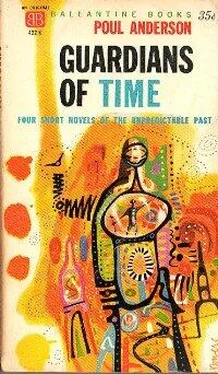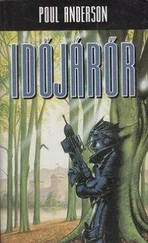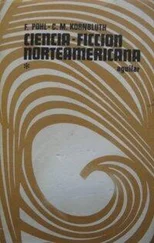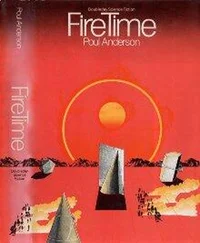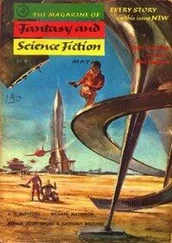Poul Anderson - Guardians of Time
Здесь есть возможность читать онлайн «Poul Anderson - Guardians of Time» весь текст электронной книги совершенно бесплатно (целиком полную версию без сокращений). В некоторых случаях можно слушать аудио, скачать через торрент в формате fb2 и присутствует краткое содержание. Год выпуска: 1962, Издательство: Ballantine, Жанр: Альтернативная история, на английском языке. Описание произведения, (предисловие) а так же отзывы посетителей доступны на портале библиотеки ЛибКат.
- Название:Guardians of Time
- Автор:
- Издательство:Ballantine
- Жанр:
- Год:1962
- ISBN:нет данных
- Рейтинг книги:3 / 5. Голосов: 1
-
Избранное:Добавить в избранное
- Отзывы:
-
Ваша оценка:
- 60
- 1
- 2
- 3
- 4
- 5
Guardians of Time: краткое содержание, описание и аннотация
Предлагаем к чтению аннотацию, описание, краткое содержание или предисловие (зависит от того, что написал сам автор книги «Guardians of Time»). Если вы не нашли необходимую информацию о книге — напишите в комментариях, мы постараемся отыскать её.
“Delenda est” Dec 1955;
“Brave To Be A King” Aug 1959;
“The Only Game in Town” Jan 1960;
“Gibraltar Falls” Oct 1975.
Guardians of Time
Guardians of Time — читать онлайн бесплатно полную книгу (весь текст) целиком
Ниже представлен текст книги, разбитый по страницам. Система сохранения места последней прочитанной страницы, позволяет с удобством читать онлайн бесплатно книгу «Guardians of Time», без необходимости каждый раз заново искать на чём Вы остановились. Поставьте закладку, и сможете в любой момент перейти на страницу, на которой закончили чтение.
Интервал:
Закладка:
When he gathered that slavery existed here, though not on racial lines, Everard wondered briefly and wildly if the time changers might not have been Dixiecrats.
Enough! He had his own neck, and Van’s, to think about. “We are from Sirius,” he declared loftily. “Your ideas about the stars are mistaken. We came as peaceful explorers, and if we are molested, there will be others of our kind to take vengeance.”
Deirdre looked so unhappy that he felt conscience-stricken. “Will they spare the children?” she begged. “The children had nothing to do with it.” Eyerard could imagine the vision in her head, small crying captives led off to the slave markets of a world of witches.
“There need be no trouble at all if we are released and our property returned,” he said.
“I shall speak to my uncle,” she promised, “but even if I can sway him, he is only one man on the Council. The thought of what your weapons could mean if we had them has driven men mad.”
She rose. Everard clasped both her hands—they lay warm and soft in his—and smiled crookedly at her. “Buck up, kid,” he said in English. She shivered, pulled free of him, and made the hex sign again.
“Well,” demanded Van Sarawak when they were alone, “what did you find out?” After being told, he stroked his chin and murmured. “That was one glorious little collection of sinusoids. There could be worse worlds than this.”
“Or better,” said Everard roughly. “They don’t have atomic bombs, but neither do they have penicillin, I’ll bet. Our job is not to play God.”
“No. No, I suppose not.” The Venusian sighed.
4
They spent a restless day. Night had fallen when lanterns glimmered in the corridor and a military guard unlocked the cell. The prisoners were led silently to a rear exit where two automobiles waited; they were put into one, and the whole troop drove off.
Catuvellaunan did not have outdoor lighting, and there wasn’t much night traffic. Somehow that made the sprawling city unreal in the dark. Everard paid attention to the mechanics of his car. Steam-powered, as he had guessed, burning powdered coal; rubber-tired wheels; a sleek body with a sharp nose and serpent figurehead; the whole simple to operate and honestly built, but not too well designed. Apparently this world had gradually developed a rule-of-thumb engineering, but no systematic science worth talking about.
They crossed a clumsy iron bridge to Long Island, here also a residential section for the well-to-do. Despite the dimness of oil-lamp headlights, their speed was high. Twice they came near having an accident: no traffic signals, and seemingly no drivers who did not hold caution in contempt.
Government and traffic… hm. It all looked French, somehow, ignoring those rare interludes, when France got a Henry of Navarre or a Charles de Gaulle. And even in Everard’s own twentieth century, France was largely Celtic. He was no respecter of windy theories about inborn racial traits, but there was something to be said for traditions so ancient as to be unconscious and ineradicable. A Western world in which the Celts had become dominant, the Germanic peoples reduced to a few small outposts… Yes, look at the Ireland of home; or recall how tribal politics had queered Vercingetorix’s revolt… But what about Littorn? Wait a minute! In his early Middle Ages, Lithuania had been a powerful state; it had held off Germans, Poles, and Russians alike for a long time, and hadn’t even taken Christianity till the fifteenth century. Without German competition, Lithuania might very well have advanced eastward…
In spite of the Celtic political instability, this was a world of large states, fewer separate nations than Everard’s. That argued an older society. If his own Western civilization had developed out of the decaying Roman Empire about, say, 600 A.D., the Celts in this world must have taken over earlier than that.
Everard was beginning to realize what had happened to Rome, but reserved his conclusions for the time being.
The cars drew up before an ornamental gate set in a long stone wall. The drivers talked with two armed guards wearing the livery of a private estate and the thin steel collars of slaves. The gate was opened and the cars went along a graveled driveway between lawns and trees. At the far end, almost on the beach, stood a house. Everard and Van Sarawak were gestured out and led toward it.
It was a rambling wooden structure. Gas lamps on the porch showed it painted in gaudy stripes; the gables and beam-ends were carved into dragon heads. Close by he heard the sea, and there was enough light from a sinking crescent moon for Everard to make out a ship standing in close: presumably a freighter, with a tall smokestack and a figurehead.
The windows glowed yellow. A slave butler admitted the party. The interior was paneled in dark wood, also carved, the floors thickly carpeted. At the end of the hall was a living room with over-stuffed furniture, several paintings in a stiff conventionalized style, and a merry blaze in an enormous stone fireplace.
Saorann ap Ceorn sat in one chair, Deirdre in another. She laid aside a book as they entered and rose, smiling. The officer puffed a cigar and glowered. Some words were swapped, and the guards disappeared. The butler fetched in wine on a tray, and Deirdre invited the Patrolmen to sit down.
Everard sipped from his glass—the wine was an excellent Burgundy—and asked bluntly, “Why are we here?”
Deirdre dazzled him with a smile. “Surely you find it more pleasant than the jail.”
“Of course. As well as more ornamental. But I still want to know. Are we being released?”
“You are…” She hunted for a diplomatic answer, but there seemed to be too much frankness in her. “You are welcome here, but may not leave the estate. We hope you can be persuaded to help us. You would be richly rewarded.”
“Help? How?”
“By showing our artisans and Druids how to make more weapons and magical carts like your own.”
Everard sighed. It was no use trying to explain. They didn’t have the tools to make the tools to make what was needed, but how could he get that across to a folk who believed in witchcraft?
“Is this your uncle’s home?” he asked.
“No, my own,” said Deirdre. “I am the only child of my parents, who were wealthy nobles. They died last year.”
Ap Ceorn clipped out several words. Deirdre translated with a worried frown: “The tale of your advent is known to all Catuvellaunan by now; and that includes the foreign spies. We hope you can remain hidden from them here.”
Everard, remembering the pranks Axis and Allies had played in little neutral nations like Portugal, shivered. Men made desperate by approaching war would not likely be as courteous as the Afallonians.
“What is this conflict going to be about?” he inquired.
“The control of the Icenian Ocean, of course. In particular, certain rich islands we call Ynys yr Lyonnach.” Deirdre got up in a single flowing movement and pointed out Hawaii on a globe. “You see,” she went on earnestly, “as I told you, Littorn and the western alliance—including us—wore each other out fighting. The great powers today, expanding, quarreling, are Huy Braseal and Hinduraj. Their conflict sucks in the lesser nations, for the clash is not only between ambitions, but between systems: the monarchy of Hinduraj against the sun-worshipping theocracy of Huy Braseal.”
“What is your religion, if I may ask?”
Deirdre blinked. The question seemed almost meaningless to her. “The more educated people think that there is a Great Baal who made all the lesser gods,” she answered at last, slowly. “But naturally, we maintain the ancient cults, and pay respect to the more powerful foreign gods too, such as Littorn’s Perkunas and Czernebog, Wotan Ammon of Cumberland, Brahma, the Sun… Best not to chance their anger.”
Читать дальшеИнтервал:
Закладка:
Похожие книги на «Guardians of Time»
Представляем Вашему вниманию похожие книги на «Guardians of Time» списком для выбора. Мы отобрали схожую по названию и смыслу литературу в надежде предоставить читателям больше вариантов отыскать новые, интересные, ещё непрочитанные произведения.
Обсуждение, отзывы о книге «Guardians of Time» и просто собственные мнения читателей. Оставьте ваши комментарии, напишите, что Вы думаете о произведении, его смысле или главных героях. Укажите что конкретно понравилось, а что нет, и почему Вы так считаете.
